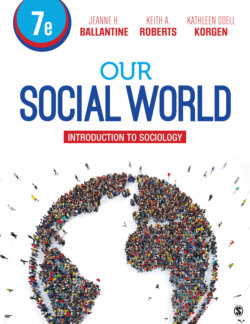Читать книгу Our Social World - Kathleen Odell Korgen - Страница 140
На сайте Литреса книга снята с продажи.
Conflict Theory.
ОглавлениеWith rapid change from processes of globalization, many global citizens face uncertain futures. These rapid changes result in excitement for those who see prosperity and success in the global trends, to those who see threats to their familiar ways of life. How do different theoretical perspectives try to make sense of the changes? Whereas functionalists assume consensus exists because all people in society have learned the same cultural values, rules, and expectations, conflict theorists do not view culture as having this uniting effect. Conflict theorists describe societies as composed of meso-level groups—class, ethnic, religious, and political groups—vying for power. Each group protects its own self-interests and struggles to make its own cultural ways dominant in the society. Instead of consensus, the dominant groups may impose their cultural beliefs on minorities and other subcultural groups, thus laying the groundwork for conflict. Conflict theorists identify tension between meso and macro levels, whereas functionalists tend to focus on harmony and smooth integration between those levels.
▲ Conflict theorists believe that society is composed of groups, each acting to meet its own self-interests. In 2018, Greek taxi drivers rallied against Uber, which charges cheaper rates because it employs mostly part-time workers and does not pay benefits. According to public transportation associations, car-booking services undermine the livelihoods of taxi drivers.
© Sipa via AP Images
Conflict theorists argue that the people with privilege and power in society manipulate institutions such as religion and education. In this way, average people learn the values, beliefs, and norms of the privileged group and accept the dominant group’s beliefs, self-interests, power, and advantage. The status of the privileged will likely be secure. In many school districts, for instance, schools that serve lower-class children teach obedience to authority, punctuality, and respect for superiors—behaviors that make for good laborers and compliant workers. The children of the affluent, meanwhile, are more likely to attend schools stressing divergent thinking, creativity, and leadership, attributes that prepare them to occupy the most professional, prestigious, and highly rewarded positions in society. Conflict theorists point to this control of the education process by those with privilege as part of the overall pattern by which the society benefits the rich.
Conflict theory can also help us understand global dynamics. Many poor nations feel that the global system protects the self-interests of the richest nations and that those rich nations impose their own culture, including their ideas about economics, politics, and religion, on the poorer nations of the Global South. Some scholars believe there is great richness in local customs that is lost when homogenized by cultural domination of the powerful nations (Eitzen and Zinn 2012; Ritzer and Dean 2014).
Conflict theory is useful for analyzing the relationships between societies (at a macro level) and between subcultures (at a meso level) within complex societies. It also helps illuminate tensions in a society when local (micro-level) cultural values clash with national (macro-level) trends. Conflict theory is not as successful, however, in explaining simple, well-integrated societies in which change is slow to come about and cooperation is an organizing principle.
Actually, conflict may contribute to a smoother-running society in the long run. German sociologist Georg Simmel (1858–1918) and American sociologist Lewis Coser (1913–2003) blended insights from functional and conflict perspectives, insisting that conflict sometimes serves a positive purpose. One example is that it can alert societal leaders to problem areas that need attention; conflict can also serve to bond people together in opposition to others. Both scholars agree that some degree of conflict is essential for any group to be viable—which is a pretty strong statement about how important conflict is (Coser, 1956; Simmel 1904, 1955).
